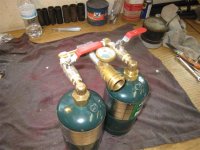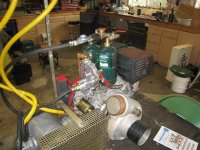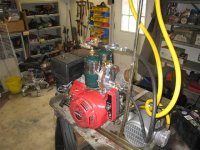Bonaro
Hero Member
- Aug 9, 2004
- 977
- 2,213
- Detector(s) used
- Minelab Xterra 70, Minelab SD 2200d, 2.5", 3", 4"and several Keene 5" production dredges, Knelson Centrifuge, Gold screw automatic panner
- Primary Interest:
- Prospecting
The environmentalists have many issues with dredgers one being refueling in the water and the possibility of spilling gas.
I have been researching LP gas conversion for small engines and I am about to order a retrofit kit to convert my 11hp Honda dredge motor. I see the pro's being a much cleaner fuel with no spills, easy refueling and cheaper fuel cost.
Does anyone have any experience with propane conversion of small governor controlled engines?
I have been researching LP gas conversion for small engines and I am about to order a retrofit kit to convert my 11hp Honda dredge motor. I see the pro's being a much cleaner fuel with no spills, easy refueling and cheaper fuel cost.
Does anyone have any experience with propane conversion of small governor controlled engines?
Upvote
0



 ?John
?John



 s......no glory(censor would a got it anyhow) Paid $2.86 here in Redding-took both trucks and filled them to the brim as been soooooooooooooooooooooooooooooooo long since under $3. Both propane tanks full from summer as I bbq all year so no current price,was way over $4 this summer. John
s......no glory(censor would a got it anyhow) Paid $2.86 here in Redding-took both trucks and filled them to the brim as been soooooooooooooooooooooooooooooooo long since under $3. Both propane tanks full from summer as I bbq all year so no current price,was way over $4 this summer. John






